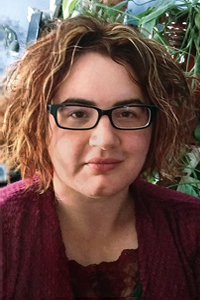Kameron Hurley: It’s OK if this Email Finds You Well
 It’s perfectly fine if you’re doing okay right now.
It’s perfectly fine if you’re doing okay right now.
The odds are against it, but it’s absolutely all right to answer ‘‘How are you?’’ with ‘‘I’m… okay?’’ Because at some point, each of us will complete the five or seven stages of grief that accompany slow-moving crises and pandemics and disasters like the one currently sweeping the globe, and we will carry on.
Humans are resilient creatures, to both our benefit and detriment.
As a marketing copywriter by day, I’ve been the one writing a lot of those ‘‘In these difficult times’’ emails for various brands and organizations. After a while, the platitudes all start to run together. After a while, ‘‘These difficult times’’ become ‘‘life as we know it.’’ It normalizes, as all horrors do, because that is the way of humanity, and we move on to – not business as ‘‘usual’’ – but business as transformed.
Unexpected change is difficult for me. It was the same when I got diagnosed with an immune disorder in my twenties. Once I got over the initial crisis of surviving, the weight of my whole new existence came tumbling down on me. It took about two years to process that this was my new normal. I had all the classic grief stages: denial, anger, depression, bargaining, grim humor, and finally – acceptance. I have recognized those stages here over the last few months.
Times of upheaval require swift action, certainly, but it’s also vital to our mental health to emotionally process traumatic events. This isn’t always possible when we are immediately forced to worry about our day-to-day survival. The processing, for me, comes after the crisis has passed, which is what makes slow-moving disasters so emotionally and physically fraught.
I’m used to working through my emotions and building narrative through my writing. It’s how I’ve processed trauma of various kinds throughout my life. As with all of those other events, I’ve found it difficult to do that writing-about- trauma while still hip-deep in said crisis.
The cost of upheaval, for me, has been my ability to focus. It’s only recently that I’ve been able to focus on projects that are longer than a few pages. For a good six weeks, it was all I could do to scrape by completing day job projects and my monthly Patreon story. Inability to focus is also a key indicator of stress and anxiety. When I spoke to my doctor a month back about my problems focusing and my turn toward deepening anxiety, she urged me to wait a few weeks and see if it improved, as these were wholly natural responses to living in a world in crisis.
So I muddled along with my current medications and meditations, gardening and cooking, as my body and mind processed grief.
It turns out that working with your hands improves anxiety and depression, which explains why so many of us are baking bread and sewing masks. I’m cooking a lot of different kinds of curries: beef or lamb korma, saag paneer and tofu tikka masala. Outside, my garden has transformed so dramatically that even photos from last year seem to depict a foreign place.
I have found myself in the odd situation of understanding that many of my fans come to my writing – both fiction and non-fiction – to be inspired, and to find some glimmer of hope in the darkness. In the early days of the pandemic here, back in March, it was tough for me to come up with anything resembling hope. The federal government in the US did what it’s been doing for the last four years, and left us all at the mercy of local government, encouraging states to fight over vital resources. I’m fairly sure I spent a twoweek period, back there during our initial quarantine in mid-March, drinking pretty much every day and stress-buying plants for the garden.
What’s up to us is what kind of neighbor we will be, when the crisis comes. This crisis is showing all of us who we really are.
There is a lot of horror in going through any crisis, and it can wear you down. But horror is not the whole story, and humanity is full of positive acts and examples that we don’t speak enough about. The scattered local governments and countries who understand that government’s role is to coordinate effective disaster response to save lives (because many have gotten it right!). The governors who loaned out ventilators to other states hit harder by the pandemic. The state coalitions working together in the absence of federal support. The people sewing 40 masks a day for friends and relatives. The neighbors dropping off groceries for the most vulnerable. Those who go out of their way to follow public health guidelines to spare not only themselves but also their neighbors from the ravages of an evolving virus.
We like to point and jeer at the worst of us and don’t spend enough time celebrating the best of us. There’s good reason humanity has lasted this long, and it’s not because we formed death cults and threw ourselves off cliffs. It’s because we care for one another and our communities. In the end, all we have is each other. What’s up to us is what kind of neighbor we will be, when the crisis comes. This crisis is showing all of us who we really are.
As I have emerged from my five or seven or seventy-five stages of grief, I have found that it is focusing on those small, competent, compassionate wins that is helping me focus again. I’ve been able to open up a manuscript again and concentrate on stringing together narrative. I am starting to process the new normal. I can’t tell you that it’s a better normal than before, but it has forced me to look at what is truly necessary and important in my life. It has reminded me how much time I spent doing things that did not, in fact, spark joy. It has reminded me, once again, of the transience and frailty of life, and the importance of enjoying every glorious moment we are given.
So I spend more time outside in my hammock. I spend more time chasing the dogs around the yard. I have never felt so connected to friends and family, with regular Zoom calls and texting and drunk Google happy hours.
Some of those emails do, indeed, now find me sort-of okay.
Humans are resilient.
The truth is that worlds are ending all the time; new worlds are being born all the time. Life is change. I take strange comfort in the quote from Antonio Gramsci that goes: ‘‘The old world is dying, the new world is struggling to be born; now is the time of monsters.’’
The comfort I take is that we have been through the times of monsters before. And we will again. The time of monsters is necessary on our way to what happens next. No new world was ever birthed without pain.
What that world will be, on the other side of an ongoing pandemic that could be circulating and mutating amongst us for several years before a vaccine rolls out, well… good or bad, that world will be different.
It’s the certainty of that, the certainty of change, that is the hope threading through my work in this moment. The certainty that there is a world after this one.
Kameron Hurley is the author of The Stars are Legion and the award-winning essay collection The Geek Feminist Revolution, as well as the God’s War Trilogy and The Worldbreaker Saga. Hurley has won the Hugo Award, Kitschy Award, Locus Award, BFA Award, and Sydney J. Bounds Award for Best Newcomer. She was also a finalist for the Arthur C. Clarke Award, the Nebula Award, and the Gemmell Morningstar Award. Her short fiction has appeared in Popular Science Magazine, Lightspeed Magazine, and many anthologies. Hurley has also written for The Atlantic, Bitch Magazine, The Village Voice, and Entertainment Weekly. She posts regularly at KameronHurley.com.
All opinions expressed by commentators are solely their own and do not reflect the opinions of Locus.
This article and more like it in the June 2020 issue of Locus.
 While you are here, please take a moment to support Locus with a one-time or recurring donation. We rely on reader donations to keep the magazine and site going, and would like to keep the site paywall free, but WE NEED YOUR FINANCIAL SUPPORT to continue quality coverage of the science fiction and fantasy field.
While you are here, please take a moment to support Locus with a one-time or recurring donation. We rely on reader donations to keep the magazine and site going, and would like to keep the site paywall free, but WE NEED YOUR FINANCIAL SUPPORT to continue quality coverage of the science fiction and fantasy field.







